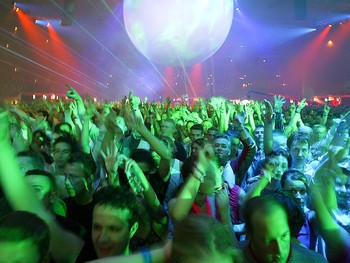Worship Week continues here at Bill in the Blank with a guest post by Dustin Germain. His blog is The Paperthin Hymn.
The following is a response to the post Why I’ve Stopped Singing in Your Church:
I remember going off to youth events such as YC, Richter, Revolution, Re;vive, and worshiping for hours to what I had considered back then phenomenal worship music. It was loud, it was catchy, it was about my love for Jesus, and some songs would last over half an hour. Rhythmic. Pulsating. They would build and build and then when we could not bear it any longer — when the weight of our tears and composure were straining at the seams, it would come crashing down in a crescendo of key changes and pure white hot bliss.
Getting a Spiritual Buzz
In the aftermath, I would feel warm and spiritually buzzed. I felt drained, spent, and yet so very, very happy. In those moments I felt close to God. When people said “The spirit really showed up” I couldn’t help but echo that statement, as I knew exactly what they meant. I remember being a teen and later a young adult in a church which had a very talented worship team, and while perhaps not to the same degree as the big conferences, they were usually able to match the intensity and whip me and my friends up into a frenzy. More often than not all they needed was the right Hillsong song and we were good to go.
But those moments of being buzzed and feeling close to God did not last too long. When we would have youth on Friday, I was high all night. That feeling would wane a little on Saturday, got a small uptick on Sunday, sag on Monday, and then by Tuesday it had all but dissipated. I did not feel close to God. I did not feel spiritual. Half the time I didn’t even feel like a Christian.
I found myself longing for that spiritual high that I felt. Instead of basking in it, I found myself chasing it. Needing it. Coveting it. I found myself counting the hours until Friday would come, so that I could worship and get back those feelings that I had lost. On Friday I was loved by God and I knew he was happy with me — on Monday I was depressed and sensed his disapproval. On Friday he was pleased with me — on Monday his disappointment was tangible. Because, after all, if God and I were tight then I wouldn’t be feeling so disconnected from him. I would feel the same way I did during worship.
This was, upon much reflection, a very strange time.
Worship as a Weapon?
Yet in the years since then I have learned some valuable lessons. Chief among them is the realization than an emotional high is no substitute for true spirituality. No one tells Church-kids that, but its true. I’ve learned that absent knowledge, even the worship of Christ can be used as a weapon against me. When we treat the worship-high like heroin in an addict’s hands, people are going to get hurt.
I’ve learned that often worship music can be little more than manipulation and is used that way to varying degrees consciously or unconsciously. I’ve learned that most variations of the expression “the holy spirit really showed up” in particularly intense worship session is a Christological joke and is theological poison.
I’ve learned that a kid can attend youth group, spend two hours in heaving sobs while on her knees with hands raised, and not once have tasted anything close to a true, legitimate encounter with the Holy Spirit. I’ve learned those experiences can mess her up, and that same kid can, after youth is over, smoke a joint and have sex with her boyfriend, the last two hours seemingly forgotten.
I’ve learned that the point of worship can be not to teach doctrine and to deepen our knowledge of God, but rather to recite silly and shallow lyrics about nothing.
I’ve learned that chasing the emotional high can crush a soul. That it makes people think such experiences are normative for the Christian life. When they fail to experience it consistently, they grow bitter and disillusioned. It can foster depression and angst and whets the sharpening stone for the knife that slaughters the sheep. Instead of developing depth it breeds shallowness, immaturity, and confusion.
I’ve learned that because worship can become the biggest draw for the church, worship nights will steamroll over Bible studies and adult Sunday school. That a church oftentimes will pour much more resources, energy, thought and time into making a killer worship service than they will into developing deep, thoughtful, meaty, mature, theologically precise and provoking Bible studies.
Warning: Worship in Progress!
I’ve learned that parents and pastors will send their children away to youth group and conferences without ensuring that they have solid teaching on what worship is, how it functions, and how it relates to the gospel and God’s pleasure with you. There are no warnings of “Don’t mistake the spiritual high for biblical sanctification. Its not real!” but rather they will tacitly endorse that sort of confusion. They’ll let the seedy underbelly of mainstream evangelical goofiness swallow up their kids and spit out the bones. Then they’ll wonder why their sons and daughters leave the Church after high school.
I’ve learned that there are tons of people out there like me who have been burned by this sort of thing — who have been beat up and are fellow bruised reeds — victims of men and women with good intentions but no discernment. They thought they were doing us a favor but should have known better.
True Worship Is Beautiful and Satisfying
Lastly, I’ve learned that worship is beautiful and that giving praise to Christ is satisfying. That giving him glory is right. That honoring him is freeing and rejoicing with him is like a warm blanket to the soul. That communicating with our Savior though this medium is a wonderful and powerful thing. That when we worship in spirit and in truth we will grow through it. In the years since then I’ve been blessed to understand that the emotions and feelings that can be associated with worship are no substitute for the actual work of the Holy Spirit in our life, even as those feelings and emotions can be a very important part of it.
Most importantly, I’ve learned that God’s pleasure in me is not predicated upon my moral behavior or in some hype and emotional subtext I feel, but rather on the cross of Christ, which is the kindness of God that leads me to repentance.
Have you known the church worship experiences Dustin describes? What do you think of his warning against becoming addicted to an emotional worship-high? Leave a comment to share the growth.
Worship Week: Post 3 ~ Why God Church Music Is So Hard to Find












